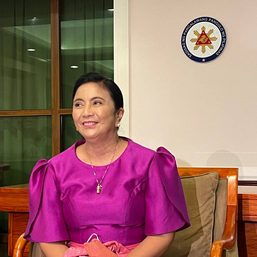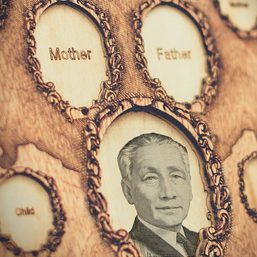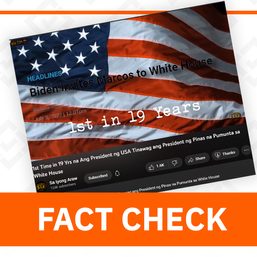SUMMARY
This is AI generated summarization, which may have errors. For context, always refer to the full article.
![[OPINION] Fear for the country’s future](https://www.rappler.com/tachyon/2022/05/TL-marcos-duterte-lawless-future-May-27-2022.jpg)
The election is over. It was not the outcome we hoped and worked for. Now to live with the reality of a Marcos Jr. presidency.
This new chapter has its roots a half century ago when the country was under martial law by a strongman wanting to stay in power. By 1980, large parts of the country were in turmoil. From 1983 to 1985, the economy imploded sparked by the assassination of Benigno ‘Ninoy’ Aquino.
In February 1986, the EDSA People Power Revolution overthrew the dictatorship after an election where massive, institutional cheating was exposed.
The next six years under the new government of Corazon C. Aquino was a period of restoration, rebuilding institutions essential to a functioning democracy – the separation of powers, accountability of government both national and local, a fair and honest judicial system, a functioning free market system, education and well-being for all.
The following six years under Fidel V. Ramos were years rebuilding the economy. The Philippines was poised to be the next tiger of Asia until the Asian financial crisis hit. After that, we have had backsliding under different presidents with only one focused on building and supporting the institutions important to a functioning democracy – the late Benigno “Noynoy” Aquino III.
‘Continuity’
And now here we are after an election has brought back the Marcoses. What can we expect over the next six years of a Marcos Jr. presidency?
This presidency will be a continuation of the Duterte years where rules and laws did not matter much and institutions weakened significantly, if not destroyed.
There will be a resolve to burnish the image of Marcos Sr. and rewrite history, selling the martial law years as a golden period.
It will be governance by social media rather than direct communication with constituents.
What worries me most about this development? There are three immediate concerns about his ability to govern and lead.
One, Marcos Jr. comes into office with a lot of political debt he cannot ignore. Four of these are to powerful women:
- Sara Duterte, his running mate, whose shift in support raised Marcos Jr’s already high numbers and guaranteed him the bulk of votes in the south around her father’s name. She also agreed to step aside as a challenger which would have drained votes from him;
- Former president Gloria Macapagal Arroyo who used her reach in vote-rich Central Luzon and among entrenched political families in congress to endorse Marcos Jr.;
- His mother, Imelda Marcos, who wants nothing more than a guarantee of no prosecution under the law; and,
- Senator Imee Marcos, Marcos Jr’s older sister who has been a mentor and protector.
But there are many other debts to repay from the large number of congressmen, governors and mayors who endorsed him and will expect some payback. Will this be a slide back to transactional politics?
Two, a very thin platform of government offered.
There was little, if anything, of this presented during the campaign. Nothing or little was offered on how he planned to introduce change. And what little was offered was incoherent or made little economic sense. What are the plans to grow the economy, create jobs, raise standards of living in the country? What would foreign policy be like? Will national patrimony be protected from foreign intrusion?
Three, historical revisionism.
Social media was used by the Marcos Jr. campaign to recondition the thinking of the populace about the Martial Law years, the Marcos legacy, and the source of the Marcos wealth, much, if not all of it dealing in disinformation, fake news and lies. Marcos Jr. said so in a video to cheering supporters after the elections of the important role paid troll farms played in his campaign.
With his assumption to power, Marcos Jr. has already stated that history will be rewritten in the textbooks to correct the ‘misinformation’ there of the Martial Law years. (Never mind that these textbooks have actually been silent on Martial Law choosing to downplay a terrible past rather than study and learn from it. Jose Rizal wrote, that a people who forget the past are likely to repeat it.
With this return to power, we will see long term of dynastic politics starting with the families of the presumptive president and vice president. Never mind that academic studies have shown that local governments with so-called fat dynasties are those that tend to grow slowest, have poorer services, and high incidences of poverty and ill-being.
Four, a return to patronage politics on a larger scale.
This form of patronage politics undermines real value creation and caters to rent-seeking behavior by powerholders where those that control resources or power gain added wealth without any reciprocal contribution to productivity.
What will be the effect on the country, on the economy, on society?
Our social fabric
One, we will continue to be a weak state. The rule of law will continue to be compromised as it was over the past six years of the Duterte presidency. Public institutions will be staffed through transactional appointments and standards and decorum ignored as in the past administration.
Two, we will have no clear roadmap to becoming a stronger, more resilient economy. Our safety net is OFW remittances but a large number of these are from lower paid domestic workers. Worse, the country sends workers (many of whom are mothers, too) abroad when these educated workers could be doing important work here but go abroad to seek better paying jobs.
Three, on the social fabric: With the investment Marcos Jr. made over the last five years on troll armies (by his own admission), people especially the young have a distorted view of what right and wrong is, what justice, fairness, and integrity are. The fabric of society will continue to be shred further.
Given all the above, I worry most for certain sectors of our society.
I worry for the youth who are going to see a very difficult future in this country for themselves. In this environment, if you are not well-connected, life will be difficult. But I worry more that they will become cynical and jaded and decide that the best way to survive and get ahead is to play the same game. If so, this will be a downward spiral for the country and society. Or they will choose to leave the country altogether in search for a better future. (As an example, over the past two years, four dialysis nurses I have known in one dialysis center, specialist nurses all with specialized training, have migrated abroad confessing that their professional growth was impaired here nor was it being adequately rewarded.)
I worry for overseas contract workers working abroad. Over the years, their treatment followed the international reputation of the country. In particular, I worry for women OFW domestic workers many who have given up professions at home (as teachers, homemakers) or left children behind to go abroad to find better-paying jobs even if conditions are wanting.
I worry for the poor who need education and health services, jobs or livelihood, housing, and safe living conditions. Will they be receiving any of these from a government that has no clear plans or a roadmap for change?
I worry for development workers who will be red-tagged for what they do.
I worry for the reputation of the country and Filipinos in international circles. How will an unaccomplished president represent the interests of the country on the world stage?
Stand up
The country is far from being a strong, stable state. What is disconcerting is that, as a society, we continually bring ourselves down after administrations that work to try to build strong institutions and systems of governance. We mistakenly substitute strong man tactics and authoritarian rule for strong government and stability. It’s the former, in fact, that generates instability in the longer term
The last six years may have had the highest satisfaction levels in government, but institutions have been substantially weakened from the Executive to the Legislative to the Supreme Court. The rule of law is ignored. Media is being targeted. Life has become expendable especially the lives of the poor.
It is a difficult future our electorate has chosen in a Marcos Jr. presidency whether they are aware of it or not.
Is there still a future for this country?
One can be defeated or one can stand up for what is right and what is good. What these elections showed, win or lose, was that millions volunteered to support a candidate who ran on a platform of good governance and reform.
We did not get the government we wanted, but we can still have the society we need. Collective, focused voluntarism for good is the way forward to laying a new fabric for society. – Rappler.com
Juan Miguel Luz is a fellow at the FEU Public Policy Center and former education undersecretary.
Add a comment
How does this make you feel?
![[Newspoint] Improbable vote](https://www.rappler.com/tachyon/2023/03/Newspoint-improbable-vote-March-24-2023.jpg?resize=257%2C257&crop=339px%2C0px%2C720px%2C720px)
![[Newspoint] 19 million reasons](https://www.rappler.com/tachyon/2022/12/Newspoint-19-million-reasons-December-31-2022.jpg?resize=257%2C257&crop=181px%2C0px%2C900px%2C900px)



![[In This Economy] Marcos’ POGO ban is popular, but will it work?](https://www.rappler.com/tachyon/2024/07/thought-leaders-marcos-pogo-ban.jpg?resize=257%2C257&crop=255px%2C0px%2C720px%2C720px)
![[Rappler Investigates] POGOs no-go as Typhoon Carina exits](https://www.rappler.com/tachyon/2024/07/newsletter-graphics-carina-pogo.jpg?resize=257%2C257&crop=424px%2C0px%2C1080px%2C1080px)






![[EDITORIAL] Marcos, bakit mo kasama ang buong barangay sa Davos?](https://www.rappler.com/tachyon/2023/01/animated-marcos-davos-world-economic-forum-carousel.jpg?resize=257%2C257&crop_strategy=attention)

There are no comments yet. Add your comment to start the conversation.